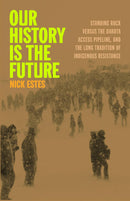Description
Nick Estes is a member of the Lower Brule Sioux Tribe and is an Assistant Professor in American Indian Studies at the University of Minnesota.
Awards:
One Book South Dakota Common Read, South Dakota Humanities Council, 2022.
PEN Oakland/Josephine Miles Literary Award, PEN America, 2020.
One Book One Tribe Book Award, First Nations Development Institute, 2020.
Finalist, Stubbendieck Great Plains Distinguished Book Prize, 2019.
Shortlist, Brooklyn Public Library Literary Prize, 2019.
Our History Is the Future is at once a work of history, a personal story, and a manifesto.
Now available in paperback on the fifth anniversary of its original publication, Our History Is the Future features a new afterword by Nick Estes about the rising indigenous campaigns to protect our environment from extractive industries and to shape new ways of relating to one another and the world.
In this award-winning book, Estes traces traditions of Indigenous resistance leading to the present campaigns against fossil fuel pipelines, such as the Dakota Access Pipeline Protests, from the days of the Missouri River trading forts through the Indian Wars, the Pick-Sloan dams, the American Indian Movement, and the campaign for Indigenous rights at the United Nations.
In 2016, a small protest encampment at the Standing Rock reservation in North Dakota, initially established to block construction of the Dakota Access oil pipeline, grew to be the largest Indigenous protest movement in the twenty-first century, attracting tens of thousands of Indigenous and non-Native allies from around the world. Its slogan “Mni Wiconi”—Water Is Life—was about more than just a pipeline. Water Protectors knew this battle for Native sovereignty had already been fought many times before, and that, even with the encampment gone, their anti-colonial struggle would continue.
While a historian by trade, Estes draws on observations from the encampments and from growing up as a citizen of the Oceti Sakowin (the Nation of the Seven Council Fires) and his own family’s rich history of struggle.
Awards:
One Book South Dakota Common Read, South Dakota Humanities Council, 2022.
PEN Oakland/Josephine Miles Literary Award, PEN America, 2020.
One Book One Tribe Book Award, First Nations Development Institute, 2020.
Finalist, Stubbendieck Great Plains Distinguished Book Prize, 2019.
Shortlist, Brooklyn Public Library Literary Prize, 2019.
Our History Is the Future is at once a work of history, a personal story, and a manifesto.
Now available in paperback on the fifth anniversary of its original publication, Our History Is the Future features a new afterword by Nick Estes about the rising indigenous campaigns to protect our environment from extractive industries and to shape new ways of relating to one another and the world.
In this award-winning book, Estes traces traditions of Indigenous resistance leading to the present campaigns against fossil fuel pipelines, such as the Dakota Access Pipeline Protests, from the days of the Missouri River trading forts through the Indian Wars, the Pick-Sloan dams, the American Indian Movement, and the campaign for Indigenous rights at the United Nations.
In 2016, a small protest encampment at the Standing Rock reservation in North Dakota, initially established to block construction of the Dakota Access oil pipeline, grew to be the largest Indigenous protest movement in the twenty-first century, attracting tens of thousands of Indigenous and non-Native allies from around the world. Its slogan “Mni Wiconi”—Water Is Life—was about more than just a pipeline. Water Protectors knew this battle for Native sovereignty had already been fought many times before, and that, even with the encampment gone, their anti-colonial struggle would continue.
While a historian by trade, Estes draws on observations from the encampments and from growing up as a citizen of the Oceti Sakowin (the Nation of the Seven Council Fires) and his own family’s rich history of struggle.


